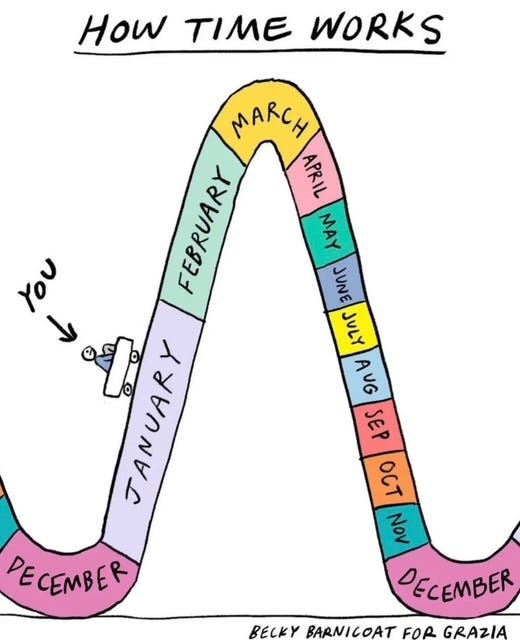The fatherhood gap: Advocating for parental leave equality
An interview with Alex Lloyd Hunter from The Dad Shift
I need your help! I have amazingly, brilliant subscribers, so I am looking to harness the wisdom of this group to write an article of reader-sourced “parenting hacks”. What are the tips or tricks that help you simplify tasks, reduce frustration, or improve efficiency as a working parent? Reply directly to this email, or submit your advice anonymously here.
Last summer, activists from the organization The Dad Shift tied baby slings to famous statues in London and Edinburgh, drawing attention to the fact that the UK has the worst parental leave in Europe. It was one of the most brilliant PR campaigns for parental leave that I’ve seen, so I reached out to one of the co-founders, Alex Lloyd Hunter for an interview.
Alex has spent his career working with charities in the UK, helping them campaign and fundraise online. He has a three year old son and founded The Dad Shift after seeing all the barriers that make it hard for dads to share childcare equally with their partners. He lives with his wife and son in Oxford UK.
JW: Could you start by giving readers a sense of the landscape around parental leave in the UK and share the inspiration behind The Dad Shift?
ALH: In the UK, we have some of the worst statutory parental leave in Europe. Moms get six weeks at 90% of their salary, then 33 weeks at statutory maternity pay, which is just £184 a week—less than half minimum wage. Fathers and other parents get two weeks of paternity leave at the same statutory rate.
Because the leave is so brief, dads miss out on bonding time with their kids. And about a third can’t afford to take any leave at all, so they go straight back to work. Kids lose out on the emotional development that comes from that paternal bond. Moms often end up as the default primary caregiver, even when families want a more shared approach. As one parent put it, “We woke up one day and found ourselves in the 1950s.”
The motherhood penalty accounts for 75% of the UK’s gender pay gap, with inadequate paternity leave at the root of a system that hasn’t caught up with modern parenting values. The Dad Shift was inspired by the need to get more men and dads involved in pushing for change. Women have led this effort and done amazing work, but it’s not fair to leave it solely on their shoulders—dads need to show up and say, “We want this too.”
JW: Here, in the US—where we have no federal paid leave—companies often provide some paid parental leave as a benefit. Does this happen in the UK?
ALH: Yes, many companies offer some kind of enhanced maternity and/or paternity pay. The levels vary a lot, though - some offer both parents six months full pay, but many still only give dads two weeks. And there are still far too many people stuck on the statutory rate.
The issue is that larger, wealthier companies are the ones offering better benefits, while smaller companies often can’t. This creates a two-tier system, where those on lower incomes, who need support the most, get the least. It entrenches economic inequalities, especially as financial pressures rise when you have a child.
JW: How has The Dad Shift advocated for fathers, and what lessons can we learn from what you’ve done?
ALH: We launched a campaign by putting baby slings on statues in London and Edinburgh—some were famous figures like footballers, actors and politicians—as well as everyday ones, like a trader making a deal with twins strapped to his chest or a man hailing a cab, looking late for nursery. The stunt resonated, sparking conversations and showing how deeply people already feel locked out of being as involved in their kids' lives as they want. Moms feel unfairly burdened, and dads feel excluded. The campaign provided a focal point for parents who know things need to change.
One lesson we’ve learned is the power of storytelling. There’s already a strong narrative about how the system impacts mothers—the lack of support, career impacts, and mental health strain. But for dads, there’s been silence. We’re working to collect and share dads' stories—online, in the press, and with decision-makers—to show how this is a shared struggle caused by a broken system and to push for change. Parents want to do things differently, and if given the opportunity, they’re ready to mobilize.
JW: You’re about to launch a big campaign focused on self-employed dads. Tell us about that.
ALH: Self-employed dads in the UK get no paternity leave at all—despite paying over £1 billion in taxes that fund things like paternity leave. Providing them with leave would cost the government just a fraction of that.
One of our co-founders, Marvin, could only afford a few days off after his child was born, which is the reality for many self-employed dads. Yet the pressures on families at that time are the same, whether you’re employed or self-employed. Your partner needs your support, and you need time to bond with your child and learn how to be a good dad.
We’ve just launched a campaign urging the government to extend paternity leave to self-employed dads—a standard in much of Europe where, once again, the UK is falling behind.
JW: I’m interested in your thoughts on best practices. What countries or organizational have strong policies or programs supporting paternity leave?
ALH: In the UK, parental leave is mostly state-funded, with companies contributing around 8%—a typical model across Europe. This approach makes sense because expecting small businesses to fund generous leave would be unsustainable. State-driven systems ensure fairness and accessibility for everyone.
In terms of the gold standard, Scandinavia leads the way. In Sweden, each parent gets 90 days of ring-fenced leave, which is key to ensuring fathers take their share, plus 300 additional days to divide as they choose. And the fact that fathers getting ring-fenced leave is really crucial for encouraging them to take it rather than just saying, “here's a bunch of shared leave, divide it up as you will”. Crucially, this leave is well-paid, as time off without proper pay excludes most families.
Spain offers another great example. In 2017, their paternity leave was just two weeks, like the UK. Over five years, they gradually increased it to 16 weeks at 100% pay. Now, fathers across all sectors—from scientists to construction workers—take nearly all their leave. This shift has led to more dads sharing childcare, stronger bonds between dads and kids, and reduced workplace discrimination for women.
Compared to the UK, all of Europe does parental leave better. But Spain and Scandinavia show how well-paid, state-funded leave can create meaningful societal change.
JW: What role does workplace culture play in supporting dads? And how can employers—on both sides of the Atlantic—make meaningful change in this regard?
ALH: Culture plays a huge role in whether people take advantage of parental leave policies. In many sectors, companies promote their generous policies, but no one uses them because the culture—whether intentionally or not—discourages it. Some companies genuinely want to improve but haven’t aligned their culture with their policies, while others are more deliberately resistant.
To change this, senior leaders need to model the behavior. If you're a senior dad about to have a child—take your full paternity leave, make it visible, and talk openly about it when you return. Share your experience and show that it’s not only acceptable but encouraged.
Another overlooked step is ensuring managers are informed. Too often, employees are met with confusion or resistance when they inquire about leave, sending a clear message that it’s not supported. Instead, managers should proactively inform expectant parents about their entitlements, ask how they’d like to take their leave, and discuss how to make it work. This signals that the company values and supports their choice, creating a much-needed cultural shift.
JW: What would you say to a dad who is interested in taking parental leave but is concerned about the potential negative professional ramifications that they might face?
ALH: That’s a tough question. It’s tempting to say, “Take what you’re entitled to, and be there for your family,” but the challenges are real. Some fathers have even had to take their employers to court for discrimination after taking parental leave or requesting flexible working.
If you feel that pressure, know you’re not alone. Seek out colleagues who’ve taken leave before—ask if their fears were overblown. Is there someone in HR or a manager you trust to discuss this with? It’s not easy, but if you want support or to connect with others who share your perspective, reach out to us—we’re happy to chat.
Lightning Round
Favorite activity to do with your son… For Christmas, my son got these really cool magnetic building blocks. I probably enjoy them more than he does. So we build these big towers with his magnetic blocks.
Favorite memory from your paternity leave… I was lucky. Running my own company, I set the paternity leave policy and got six weeks at full pay—far more than most get in this country. It wasn’t easy, as my son had feeding and sleep issues, so one of us was holding him 24/7. But I watched the entire Game of Thrones with him asleep on me. Just having that tiny baby on my chest, watching trash TV, was amazing.
Favorite resources for dads… Good question. I wish there were more. One that's kind of interesting is @the.dad.vibes on Instagram. He's a dad who shares perspective on emotionally-open parenting and he’s got quite a big following.
Best piece of advice for working parents… Oh, every working parent feels like they're failing, but you're not failing. You're doing really well and we're all in the same boat. It's tough to juggle work and the pressures of work and being a good parent, but you're doing well.
Read
Productivity books are BS. Here’s what works instead—Fast Company: I hate most productivity hacks, but loved this article (written by a working mom!)
This is no way to talk about children—The Atlantic gift link: “I don’t really like children”—this article talks about why this type of attitude treat kids as commodities rather than individuals deserving of collective care and responsibility.
They got everything they wanted professionally by 30. Then what?—Marie Claire: Turns out that making the “40 under 40” list isn’t all it’s cracked up to be.
How to write a job description that actually gets people to apply—HBR gift link: Great practical tips in here!







